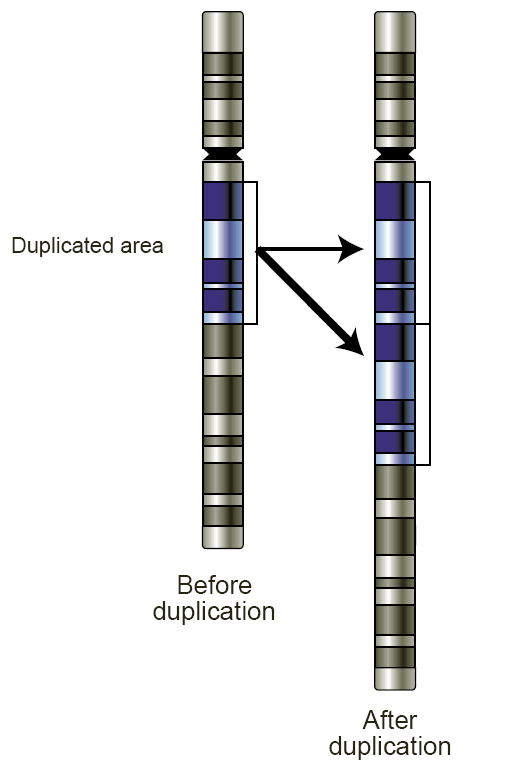 Evolutionists sometimes claim, or imply, that gene duplication is the answer to how genetic information is created (e.g. Dawkins, R., "The Information Challenge," The Skeptic, Vol 18, No 4 Dec 1998).
Evolutionists sometimes claim, or imply, that gene duplication is the answer to how genetic information is created (e.g. Dawkins, R., "The Information Challenge," The Skeptic, Vol 18, No 4 Dec 1998).
[Graphic: "Gene Duplication," Wikipedia]
But as Maynard Smith and Szathmáry note in this Quote of the Day, "In itself, a duplication does not add to the total quantity of information present: two copies of a message are not more informative than one":
"How did genetic information increase? ... The simplest process is the duplication of a piece of DNA, which can vary in length from a single gene to a whole set of chromosomes. Such accidental events are not all that infrequent. In itself, a duplication does not add to the total quantity of information present: two copies of a message are not more informative than one. All it does is to produce additional DNA that can later be programmed by selection. It is worth noting, however, that the procedure is rather different from the way in which one might add memory to a computer. In the latter case, the additional memory would initially be blank (unless one added an already programmed chip). In evolution, the new DNA already carries a message, albeit a redundant one. New information requires that this message be altered step by step. We know that the duplication of genes has been important. A classic example concerns haemoglobin, the protein that carries oxygen in the blood. It is a compound of four subunits, of two kinds, each kind programmed by a different gene. The two genes arose by duplication, followed by minor divergence. A further round of duplication and divergence produced the different haemoglobin in the fetus of mammals. Gene duplication is common, but does not always lead to an increase in information: more often, one of the two copies degenerates, because natural selection does not maintain two copies if one will do. Our chromosomes are full of such fossil genes, so-called pseudogenes. It is only occasionally that the duplicate copy acquires a new function. The important point is that duplication, whether of single genes or whole genomes, does not in itself produce significant novelty. It merely provides additional DNA that is not needed, and so can be programmed to perform new functions. It does not cause increased complexity, but it does provide the raw material for such an increase to occur later." (Maynard Smith, J. & Szathmáry, E., "The Origins of Life: From the Birth of Life to the Origin of Language," Oxford University Press: New York NY, 1999, pp.26-27. Emphasis original)
As I pointed out in a debate in 2000, commenting on a quote by Richard Lewontin, that:
"New genes, in addition to the old ones ... occurs as a two-step process. First, a gene (or group of genes) is accidentally duplicated so that a chromosome now carries an extra copy of it. Because only one good copy is needed to produce the original protein, the extra copy is free to accumulate mutations without harming the organism. After a time, enough changes may have accumulated in the duplicate to give it a new function." (Lewontin, R.C., "Human Diversity," Scientific American Library: New York NY, 1995, p.151)
"To claim that genes can duplicate, go off-line where selection cannot `see' them, accumulate new design information by random mutation, then come back on-line with whole new design information ready to be slotted back seamlessly into the system, is the equivalent of believing in genetic miracles, yet this in fact what is now the orthodox Darwinian theory, even though it is radically non-Darwinian ... But this is just hand-waving. It is compatible with an Intelligent Designer modifying genes while they are off-line, and then bringing them back online, slotting them seamlessly back into the system (just as intelligently designed computer program upgrades do), but not with a `blind watchmaker'"!
Stephen E. Jones, BSc (Biol).
`Evolution Quotes Book'




No comments:
Post a Comment